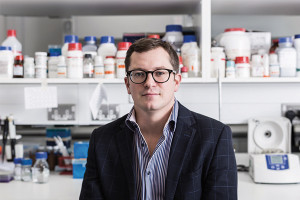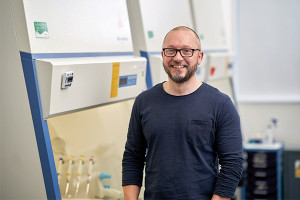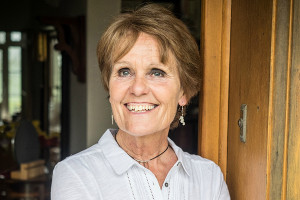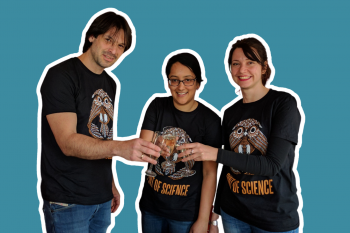© Pint of Science, 2025. All rights reserved.
Pint-sized science with Aston University
Subscribe: Spotify | TuneIn | Stitcher | Apple
We have a special four part mini-series of 'PintCast' podcasts in collaboration between researchers from Aston University. Hear about the ongoing fight with antibiotic resistant diseases, explore the link between your mental and physical health, discover the future of stem cell technology and whether the brain is affected by nature or nurture?
Sam hosts the conversations with some of Aston University’s leading researchers discussing their research, what makes them tick, how they are changing the world for the better and pushing the boundaries of the understanding of humankind.

Dr Jonathan Cox
Episode 1:
The series kicks off with Dr Jonathan Cox, director of the Mycobacteria Research Group. He specialises in antibiotic resistant diseases such as tuberculosis. Jonathan said: “Although at the moment coronavirus is big in the media and the world is locked down because of coronavirus, actually more people die every year from tuberculosis than have done this year of coronavirus by quite some sizeable margin”.
You can find Jonathan on Twitter @DrJonathanCox

Dr Rebecca Knibb
Episode 2:
Focuses on psychology, highlighting the work of Dr Rebecca Knibb. She discusses the psychology of allergies and the day to day impact on people living with allergies and the anxiety this can cause. You can find Rebecca on Twitter @rebeccaknibb81
Interested in studying Health Psychology with Rebecca? Visit the Aston University course page here.

Dr Eric Hill
Epsiode 3:
Explores the future of stem cell technology through the work of Dr Eric Hill, senior lecturer and member of Aston University’s Biosciences Research.
Eric explains: “For a long time we weren’t able to work with human brain tissue that was alive, but using stem cells we’re able to generate different brain cell types that we can use to study different diseases.”
You can find Eric on Twitter @3rdfloorlab
Interested in studying Stem Cells with Eric? Visit the Aston University course page here.

Professor Gina Rippon
Episode 4:
The mini-series closes with Professor of Cognitive Neuroimaging, Gina Rippon, talking about the thought-provoking topic of brain development and the idea of the ‘gendered brain’ – the concept that it is predominantly society, rather than our biology, which determines how and why men and women behave differently.
You can find Gina on Twitter @ginarippon1
Header Image by Sharon Pittaway on Unsplash




